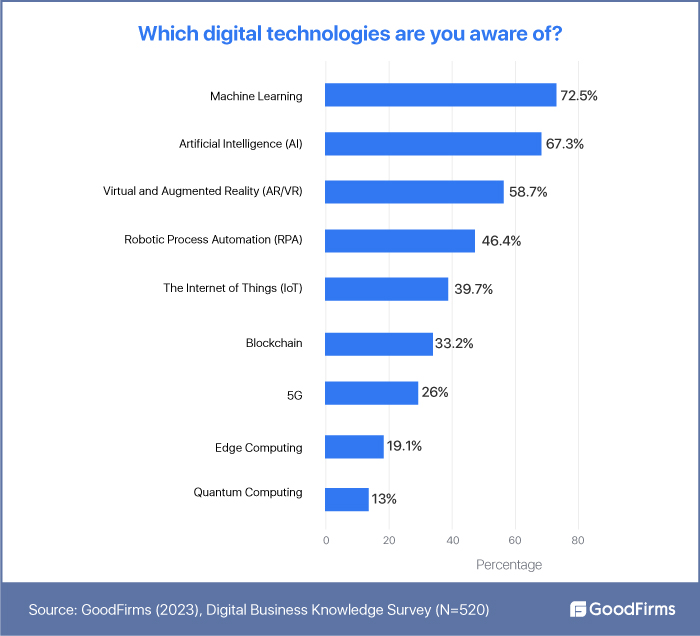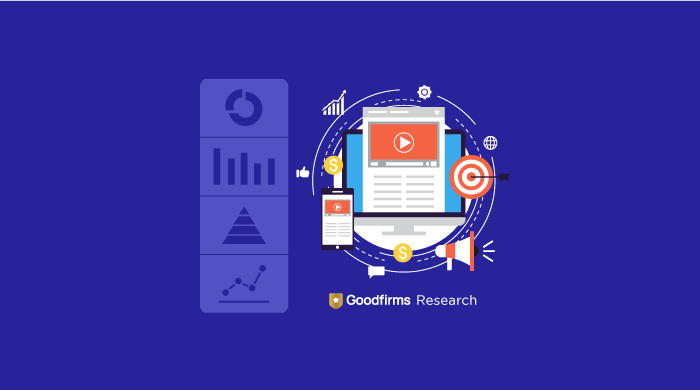ABSTRACT:
Digitization has become mission-critical for the online operations of the business, to support business continuity and sustainability. Digital business models are a giant leap over traditional ones. Adopting and prioritizing digitalization and gaining digital business knowledge are critical to succeeding in the current business environment. From increasing productivity and efficiency of core operations to better resource management and responsiveness to business needs, digitalization is the key to creating a customer-centric and high-performing organization. Coupling digitalization with business technologies paves the way for innovation, sustainability, and resilience. Digital businesses have faster time-to-market competencies and feature more transparency and operational visibility.
Agile business processes and a people/customer-centric approach are the key elements of a digital business. To achieve this, businesses can invest in digital technologies such as artificial intelligence, machine learning, virtual and augmented reality, robotic process automation (RPA), quantum computing, edge computing, blockchain, 5G, and the internet of things (IoT). These combined processes enable businesses to empower people (customers, employees, managers, etc.) to thrive, optimize all business processes, and increase the value and profitability of the company.
Goodfirms Survey titled: ‘Digital Business Knowledge’ attempts to identify and analyze the current state of digital business, its key driving factors, opportunities, barriers, and future scope of businesses in digitalization. The research draws valuable insights from executives and professionals from various industries that will enrich the understanding of business digitalization and its potential in today's world.
Table of Contents:
Introduction
An Overview of Digital Business
Survey Data Analysis
Top Digital Business Transformation Technologies
- Machine Learning
- Artificial Intelligence (AI)
- Virtual and Augmented Reality (AR/VR)
- Robotic Process Automation (RPA)
- The Internet of Things (IoT)
- Blockchain
- 5G
- Edge Computing
- Quantum Computing
Key Reasons for Business Digitization
Benefits Achieved by Organizations Post-Digitization
Barriers To Adopting Digital Business
Digital Marketing, CRM, and Accounting are the top three tools that are used by businesses
Key Findings
Conclusion
Introduction
Digital businesses are more advanced business models than traditional ones and apply digital means and technology to improve business processes and consumer relationships. This involves managing, selling, and promoting products/services using digital tools like websites, social media, mobile applications, etc., and streamlining internal processes with digital tools, software apps, and technologies such as CRM, BI, cloud computing, artificial intelligence, and more.
Digital business models can provide companies with greater insights into customer behaviors, help organizations rethink their economic models, and create new revenue streams with better value propositions. By leveraging digital technologies, organizations can shift from being a product-centric model towards customer-centric. Digital businesses are better positioned to provide enhanced customer experience with their omnichannel approach and deliver more targeted and personalized services using business analytics. Digital businesses can easily mitigate organizational silos by facilitating real-time collaboration between departments and teams with digital communication tools. Digital businesses are generally more sustainable and resilient than traditional ones.
Goodfirms Survey titled: ‘Digital Business Knowledge’ gathers valuable insights from businesses, executives, and professionals about their digitization journey and analyzes key elements associated with business digitalization. The report also identifies and discusses the most significant barriers to adopting digital business models, the benefits of digital transformations, and the top tools and technologies leveraged by digital businesses.
An Overview of Digital Business
In hyper-competitive market environments, success depends on the ability to gain complete control of processes. In dynamically changing market conditions, possessing profound knowledge of the market and achieving strategic flexibility are critical for high performance and sustainable growth. These competencies are difficult to achieve without digital adoption. The COVID-19 pandemic demonstrated the importance of digitizing mission-critical business operations (enabling teams to work remotely) for business continuity.
Digital adoption empowers organizations with the adaptability quotient necessary for surviving in unpredictable and volatile market environments.
A digital business leverages technology internally and externally. A business that primarily relies on digital technologies to develop opportunities, efficiency, and exceptional customer experiences is known as a digital business.
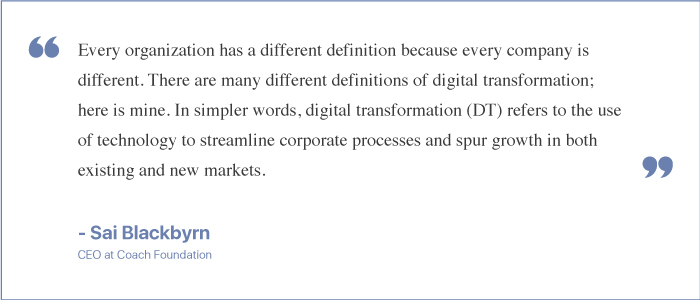
Companies can be ‘digitized’ by adopting digital technologies. Digital businesses expeditiously integrate information technologies, knowledge management tools, and communication systems to create a digital ecosystem that benefits all stakeholders (employees, executives, vendors, and customers). Their digital transformation journey starts by shifting the manual processing of mundane tasks to automated business processes that provide better realization in terms of time, capital, and effort.
Let us see some statistics on how fast the world is moving towards digital transformation:
- The global digital transformation market is predicted to reach $1,009.8 billion in 2025, which translates to a CAGR of 16.5%.(1)
- By 2025, the global economy will have grown by $100 trillion due to the digital revolution. By 2025, platform-driven interactions will enable almost two-thirds of digitization's $100 trillion potential value.(2)
- The global spending on digital transformation is expected to reach 3.4 trillion dollars by 2026.(3)
- 87% of senior business leaders believe that digitalization is a priority, and 91% of organizations are currently involved in digital activities.(4)
- Investments in Future of Work (FoW) programs focused on digital adoption will be expected to exceed one trillion dollars by 2024.(5)
Survey Data Analysis
Goodfirms surveyed 520 businesses and enterprises globally for various aspects of their digital adoption, processes, operations, benefits achieved post-digitization, and challenges faced in the transition. The survey revealed valuable insights into the current state of digital transformation in various industries.
Let us analyze the key survey findings:
78.6% of the surveyees have digitized their business processes
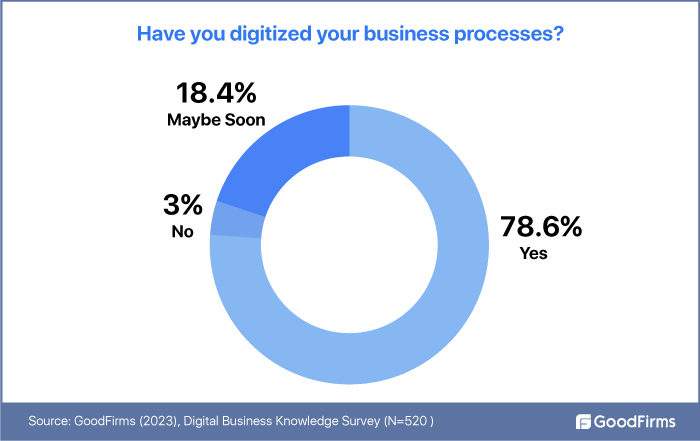
78.6% of businesses reported complete digital adoption of their business processes. These businesses have replaced manual, disconnected, and paper-based procedures by integrating digital information. More than three-fourths of the surveyed organizations have streamlined their business processes by implementing digital tools. These companies reported unique advantages to workers, partners, clients, and the business. It is initially challenging to digitize workflow, transactions, functions, and procedures, but it eventually pays off.
Top Digital Business Transformation Technologies
Organizations can use digital transformation technologies as digital solutions to develop and strengthen their skills. These solutions improve decisions, develop stronger business ties, and foresee the future when deployed successfully.
"When you apply computer science and machine learning to areas that haven't had any innovation in 50 years, you can make rapid advances that seem really incredible". - Bill Maris
According to the Goodfirms’ survey, Machine Learning, AI, and AR/VR are popular digital technologies.
Machine Learning
72.5% of respondents are aware of machine learning technology.
Businesses use machine learning algorithms in their operational activities to interpret and evaluate data to autonomously process information without requiring human input. Organizations comprehend their data and accelerate decision-making by analyzing, spotting intricate patterns, and creating projections without human input by including digitalization tools like machine learning in their digital transformation roadmap and strategy.
Artificial Intelligence (AI)
67.3% of surveyees are aware of AI technology.
AI significantly impacts organizations as it can automate and optimize procedures to save time and money, boosts the effectiveness of operations, and reduces the chances of error occurrence. Organizations implementing AI-based tools report better analysis of customer preferences, improved lead and revenue generation, etc.
Virtual and Augmented Reality (AR/VR)
58.7% of respondents are familiar with AR/VR technology.
More than half of surveyed businesses reported using AR/VR to build virtual environments that enable customer support to communicate with customers in real time. By utilizing AR/VR tech, these organizations are making it easier and faster for customers to reach the required assistance. AR and VR technology also helps organizations to improve employee output, training experience, and quality.
Robotic Process Automation (RPA)
46.4% of respondents are aware of robotic process automation.
Automation is one of the initial steps in the digital transformation of most industries. The value that RPA can produce when combined with other digital transformation technologies like AI and ML is highly productive for organizations using it. Robotics can relieve employees of the pressure of menial jobs so they may concentrate on work that requires their skills. Organizations are utilizing robotics in areas like analysis and decision-making and adding efficiency, speed, and precision to the jobs.
The Internet of Things (IoT)
39.7% of surveyees are informed about loT technology.
The digital revolution in the manufacturing sector is being driven by the Industrial Internet of Things (IIoT), often known as Industry 4.0. With this technology, businesses are enhancing workflows and increasing their flexibility, innovation, speed, and quality. IoT significantly increases customer satisfaction by offering insightful data on how customers utilize products.
Blockchain
33.2% of respondents are familiar with blockchain technology
Blockchain is a game-changing technology revolutionizing numerous business sectors, including healthcare, logistics, manufacturing, and IT, which adopt blockchain technology to forecast and address urgent issues. 33.3% of surveyed organizations reported a working knowledge of blockchain and asserted how the technology is helping them save costs, achieve efficiency, improve trust, and enhance security.
5G
26% of respondents are aware of 5G technologies.
5G promises a new era of the global digital revolution with its extraordinarily high data speeds, high traffic capacity, and extremely low latency. 75% of industrial companies consider 5G a key enabler of digital transformation.(6) IoT applications will advance to a new level with the rollout of 5G. IoT devices require increased capacity, quick transmission speeds, and seamless connectivity, which may all be provided by integrating 5G.
Edge Computing
19.1% of respondents are aware of edge computing.
Businesses use Edge computing for many purposes (for example, self-driving automobiles, autonomous robots, real-time data, and automated retail), such as enhancing the user experience, speeding up response times, protecting customer information, or reducing the computational cost or power consumption of calculations. Businesses use edge computing to monitor machinery and plan maintenance to boost capacity, avoid unplanned downtime, and improve the productivity and dependability of industrial lines.
Quantum Computing
13% of surveyees are familiar with quantum computing technology.
A fast-paced developing technology called quantum computing uses the principles of quantum physics to perform calculations that are too complicated for conventional computers. Quantum computing is the ability to store and process enormous amounts of data simultaneously, making quantum computers more powerful than traditional computers. In the future, businesses will be able to use quantum computing to solve complicated problems faster.
Key Reasons for Business Digitization
Goodfirms queried participants about the main reasons for digitizing their businesses. Lower operational costs, improved customer satisfaction, and sustainability emerged as the top reasons for digitizing businesses.
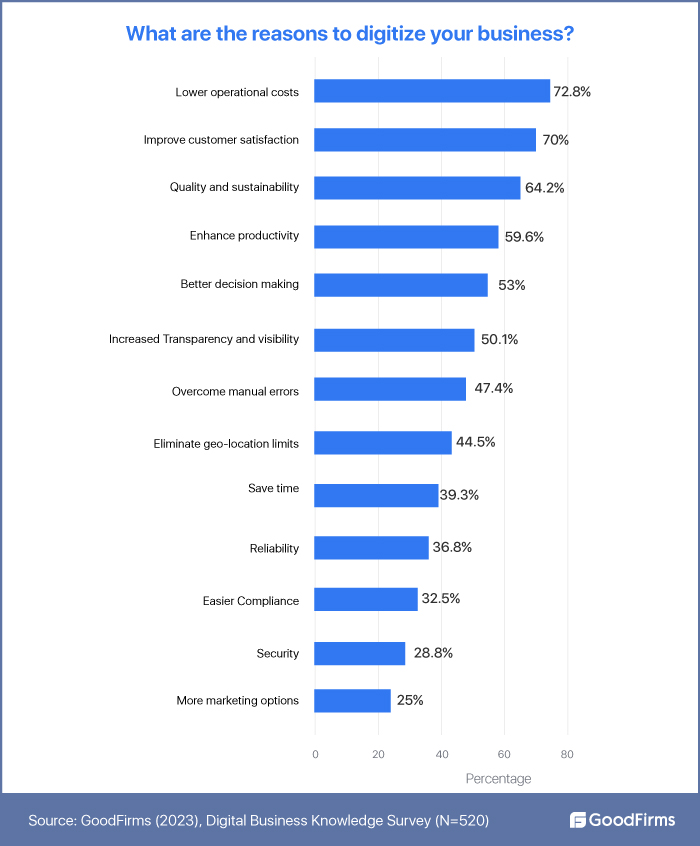
Lower operational costs
72.8% of surveyees consider lower operational costs as a primary factor for businesses to digitize.
Technology can help organizations automate business processes, reduce errors, lower costs, and improve productivity. With the help of digitization, businesses can reduce manually maintained paper documents, potentially saving a lot of money on staff, storage, and transportation. Information-intensive activities can be digitized to save costs by up to 90% and speed up turnaround times by many orders of magnitude.(7) Therefore, low operational cost is the main reason that the surveyed businesses quoted to adopt digitization.
Improve customer satisfaction
70% of respondents say digital businesses can provide better customer satisfaction.
Businesses use various digital tools (AI, ML, business analytics, and data science) and integrate different digital platforms and devices to collect and analyze information more effectively to enhance the overall consumer experience. This makes it easier for organizations to collect all the relevant information of customers to advance their operations and raise the quality of the goods and services they offer. Learning about their selected market and target audience and then adapting their business plan to meet those demands is one of the main ways to satisfy customers.
“Think of digital transformation less as a technology project to be finished than as a state of perpetual agility, always ready to evolve for whatever customers want next, and you’ll be pointed down the right path.” — Amit Zavery, VP and Head of Platform, Google Cloud.
In order to provide instant customer support, businesses now use chatbots. They are proficient at guiding customers and responding to their queries leading to better customer satisfaction.
Quality and Sustainability
According to 64.2% of surveyees, business digitization can help improve quality and sustainability.
Businesses can raise the quality of their goods and services by utilizing digital tools for data collection, storage, and analysis. The obtained analytics can provide valuable insights to improve products and services. Digital technologies can provide businesses with the edge required for decreasing resource use, implementing lean processes, and reducing environmental impact. Overall, using digital tools and technology can assist businesses in operating more qualitatively, and sustainably.
Enhance productivity
59.6% assert digitizing their operations to enhance productivity
Digital technologies help organizations improve productivity, efficiency, and effectiveness by automating internal processes and tasks (such as project management tools can help employees track and stay organized on projects). Through the digitization of business operations, employees will get more time on their hands. This extra time may be used to improve productivity, improve customer interactions, and engage in other value-creating activities.
Better decision-making
53% of the respondents have transitioned to digital to make smarter and fast decisions.
Digital technologies enable enterprises to obtain real-time information and feedback on the performance of the business and employees. Digitization can enhance the decision-making process within an organization. Digital tech generates data based on the logic that helps professionals to make informed decisions.
Increased transparency and visibility
50.1% of surveyees consider increased transparency and visibility as a reason to digitize business.
Businesses adopt digitization using digital tools and technologies to keep a detailed, more transparent, and accurate record of operations. Digitization can help companies to become more visible to consumers, shareholders, and suppliers. Therefore, digital technology can help make businesses more visible and transparent, improving their operations and trustworthiness among their partners.
Overcome manual errors
47.4% of the respondents have undergone a digital transformation to overcome manual errors
Digital Businesses can automatically collect data by replacing paper and manual procedures with software solutions. This reduces the chances of errors. Managers can solve issues before they become significant thanks to real-time statistics and dashboards on the operation of digital processes.
Eliminate geo-location limits
44.5% of surveyees consider eliminating geo-location limits a significant reason for business digitization.
With the development of the internet and digital technology, businesses can now operate and provide goods and services to customers anywhere in the world without being constrained by geographic boundaries. This has created new chances for companies to grow their customer base and tap into a worldwide market. Digital technologies make it simpler for companies to cooperate and conduct business with partners and suppliers worldwide.
Digital technologies can also assist companies in overcoming other entry obstacles, such as linguistic or cultural ones, that may have previously limited their ability to expand. The capacity to eliminate geo-location limits is a significant factor of business digitization since it enables them to access new markets and opportunities and run more effectively and efficiently.
Save time
39.3% of respondents consider saving time a reason for business digitization.
Digitization helps businesses to function more effectively and efficiently while allowing employees to concentrate more on tasks that provide value to the business and promote its growth. Multiple business processes can be automated using digital technologies, reducing the time and labor needed to execute them.
Reliability
36.8% of surveyees say business digitization enhances business reliability and, therefore, it is a prime reason for digitizing their businesses
Digital technology can assist businesses in improving the reliability of their operations by lowering the chance of errors or mistakes. By offering a safe and controlled platform for information and document sharing, digital technologies can assist businesses in increasing their communication and collaboration reliability.
Easier Compliance
32.5% of surveyees believe that digitalization can assist organizations in adhering to industry and regulatory norms in real-time.
Business digitization, often known as turning analog business procedures and records into digital ones, can make adhering to legal and industry standards simpler. Businesses may more readily track, manage, and report on their operations by digitizing business processes and records, which can help them more effectively and efficiently satisfy regulatory requirements and industry standards. Business digitalization can make it simpler for organizations to abide by data protection and privacy laws. Companies may more easily regulate access to sensitive information and ensure that it is handled in a way that complies with regulations.
Security
28.8% of respondents say that business digitization can help businesses safeguard private data from breaches.
Security is another factor for enterprises to adopt digitization. Companies can protect sensitive information and stop data breaches by digitizing their operations and documentation. Paper documents are more prone to theft or damage. Digital systems have the potential to provide more security against data breaches and prevent unauthorized access to private information as they are secured with passwords, encryption, and other security measures. Digital technology also helps in tracking who has access to confidential data.
More marketing options
25% of surveyees believe that digitalization can give businesses more marketing possibilities by making it simpler to connect with and engage with customers online.
Many customers today expect to be able to communicate with businesses online, whether that be through websites, social media, email, or other electronic means. Businesses can more easily build and maintain online presences and use digital marketing tools to reach and engage with customers by digitizing their operations and business processes. Digitization can assist businesses in increasing their marketing alternatives and online customer reach.
Benefits Achieved by Organizations Post-Digitization
More and more companies are launching digitization projects to enhance the value of their businesses. Goodfirms queried organizations that have digitized their businesses to gauge the benefits witnessed by them post their digitalization journey.
Here are the advantages indicated by organizations post-digitization:
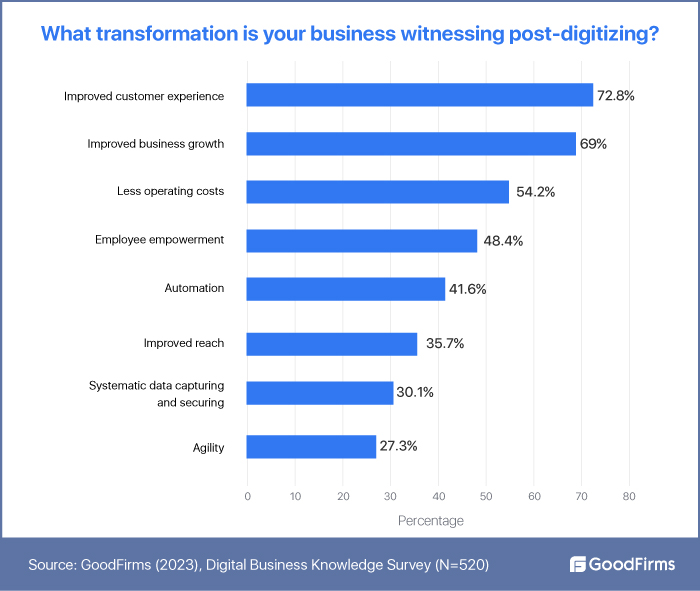
Improved customer experience
72.8% of surveyees say they witnessed improved customer experience post-digitizing.
Digital tools and technologies can make it easier for customers to interact with a business. Businesses can provide customers with personalized experiences by collecting and analyzing customer data and using digital channels like social media platforms, chatbots, and other digital platforms to provide a better customer experience. With the help of digital tools and technologies, businesses can streamline their work operations and reduce the time it takes to execute transactions or address consumer complaints.
Customers used to visit a store or shop to make physical purchases. With the development of online shopping platforms like Amazon, customers can now easily browse and buy things from the comfort of their homes and get same-day delivery service.
According to Irene Graham, CFA at Spylix
"We started a digital transformation program at our company a few years ago. To become a more customer-focused organization, we recognized that we had to alter the way we conducted business. So, we started a business-wide initiative to digitize our business operations and procedures.
This required developing digital copies of our goods and services and redesigning and improving our website's usability. We also invested in new technologies to better understand and serve our customers. Finally, we emphasized change management, ensuring that our staff members were on board with the project and knowledgeable about how to use the latest tools and procedures.
The entire project required much labor, but it was worthwhile. Our clients are more focused on them than ever before, and we are now recognized as a leader in our stream."
Improved business growth
69% of surveyees experienced robust business growth post-digitizing
The top three key enablers for business growth are customer experience, competitive edge, and innovation. Digital businesses can interact with customers in real time and around the globe through digital channels like websites, social media, and email. Businesses can develop distinctive goods and services that provide a competitive edge by implementing cutting-edge technology like artificial intelligence and machine learning.
Digitization can also help companies innovate and set themselves apart from the competition, like Uber, a ride-sharing company that has experienced rapid growth with its online booking system and mobile app.(8).
Lower operating costs
54.2% of respondents say adopting business digitization has lowered their operational costs.
Operational costs include accounting charges, office supplies, energy expenditures, resources expenses, labor, etc. The surveyed businesses have smoothened their operations and achieved more cost-effective operations by automating work procedures, eliminating redundant processes, and using data analytics to make better decisions.
For instance, IBM, the technology giant has introduced several digital initiatives, including automation and cloud computing.(9)
Employee empowerment
48.4% of surveyees believe digitization has empowered their employees
As reported by around half of the surveyed organizations, employee empowerment is one of the key benefits of digitization. Post-digitization, employees can use real-time data and insights to make better decisions and carry out their duties more successfully via dashboards, analytics, and other digital tools. It makes it easier for employees to collaborate and interact with each other and stakeholders.
Research shows that people who report having a positive employee experience have 16 times the engagement level of employees with a negative experience and that they are eight times more likely to want to stay at a company.(10)
Google has incorporated various digital technologies and procedures for employees to work more effectively and efficiently, including collaborative tools and remote work access(11). Employees can collaborate in real-time regardless of location using video conferencing, collaboration software, and other digital technologies.
Automation
41.6% of respondents revealed that their businesses are now automated post-digitization
Businesses can gain from automation in many ways. Lowering the need for human labor and increasing efficiency can assist businesses in reducing their operational expenses. Minimizing the chances of committing human error can also help enterprises improve their processes' consistency and precision. Additionally, automation enables companies to extend their operations by allowing them to handle greater workloads without raising staffing expenditures.
Overall, automation is an advantage of post-digital transformation for businesses since it can save costs, increase accuracy and efficiency, and scale operations.
Improved reach
35.7% of surveyees feel that digitization can improve reach by enabling businesses to personalize their marketing and sales efforts.
Digital media companies like Netflix have expanded their customer reach and drawn subscribers from all over the world with the help of the internet.(12) Digitization enables companies to interact with customers in real time, personalize their marketing and sales strategies, and make it simpler for customers to find and use products/services globally. Businesses may better target the audience segments by messaging and offerings using data analytics to understand customer behavior and preferences.
Digitalization can assist businesses in broadening their customer reach by helping them find and reach target customers and providing them access to the company's goods and services.
Systematic data capturing and securing
According to 30.1% of respondents, digitization enables companies to collect and organize data in a systematic and orderly manner, facilitating access, analysis, and utilization.
Digitalization aids businesses in protecting their data from illegal access, tampering, and other security risks with the help of digital tools and technology. Companies can safeguard data via data encryption, access controls, and other security measures. The Tech giant Microsoft has implemented technologies such as cloud storage and data backup systems to improve the security and availability of their data.(13)
Systematic data capturing and protecting is a post-digitalization benefit of transformation for businesses as it allows them to collect, store, and retrieve data in a systematic and organized manner and provides data security.
Agility
27.3% of surveyees witnessed agility in business after adopting digitalization.
Digitization enables businesses to become more agile because it provides them with the tools and technologies they need to respond quickly to changing market conditions and customer needs. Toyota has included automation technology like robots and automated manufacturing lines in its facilities. This enables it to react more quickly to changes in demand and enhance the effectiveness of its production procedures.(14)
Businesses may make better judgments and react to market demand more quickly by utilizing real-time data, analytics tools, and dashboards. Hence, making it easier for organizations to adjust and scale their operations, digitization can also help them become more flexible.
According to the Goodfirms survey, 38.5% of business owners characterize their digital organization as able to respond quickly to threats or opportunities compared to their competitors. At the same time, 32.6% of the respondents say all of the above characteristics.
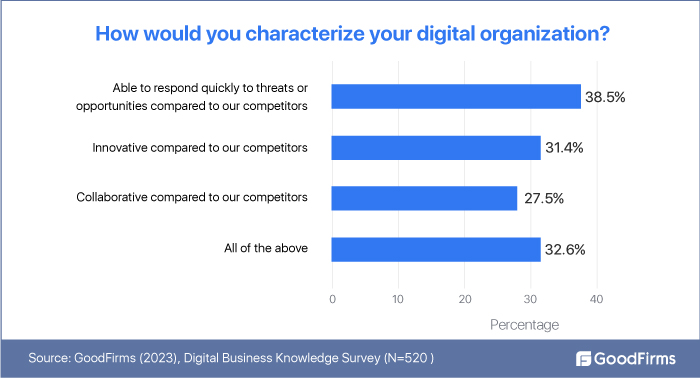
Barriers To Adopting Digital Business
“When digital transformation is done right, it’s like a caterpillar turning into a butterfly, but when done wrong, all you have is a caterpillar.” — George Westerman, MIT Sloan Initiative on the Digital Economy.
Businesses, especially entrepreneurs, face challenges from shifting consumer preferences, ongoing technological upheavals, and the expansion of aggressively competitive industries. The digitization of business operations and processes is not an easy task and comes with a set of challenges.
Goodfirms queried businesses regarding the barriers they face while adopting digital businesses. Lack of budget, executive support, and resources are top barriers reported by businesses in digital transformation journeys.
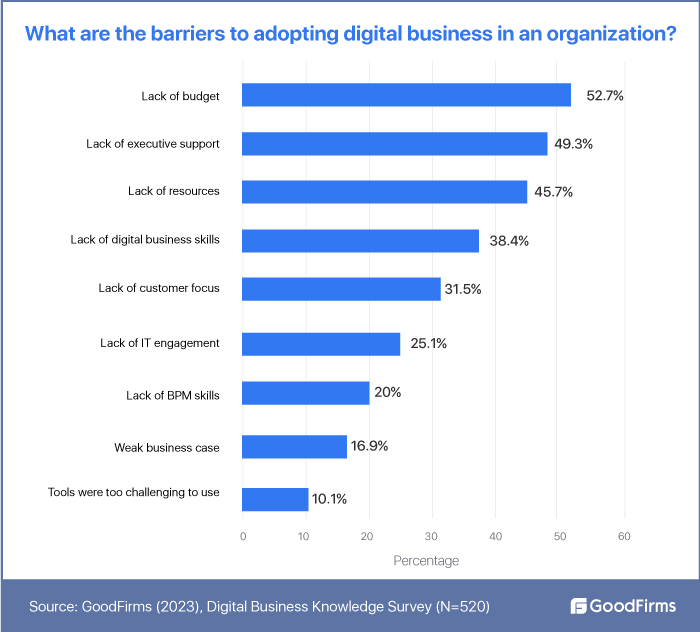
Lack of budget
52.7% of surveyees say they cannot adopt digitalization due to a lack of business budget.
A limited budget may prevent an organization from implementing digital business. Organizations may need more means to integrate digital technologies and processes since they need significant initial expenditure. Budget constraints, along with unwilling investors, can delay digital adoption.
Although cost saving is the most significant benefit of digitization, it is also a prime challenge that prevents many companies from adopting digital technologies. The initial cost of digital adoption coupled with employee training costs, implementation costs, infrastructure expenditures, and other related costs, can be extremely high. However, if companies manage this initial expense, then they can save a huge amount of recurring expenses they spend on manual processes. In the long term, digital adoption is a successful and profitable strategy.
Lack of executive support
49.3% of respondents say that lack of executive support is a barrier to digital business adoption
Digital transformation must have strong leadership and support from senior management to be effective. With this support, obtaining the materials and assistance required to carry out digital business efforts might be easier. Some leaders might be hesitant to change or have doubts about the potential advantages of digital technologies. Others can be more concerned with immediate outcomes and need help understanding the benefits of funding long-term projects.
Lack of resources
45.7% of surveyees consider needing more resources as a barrier to adopting digital business.
Organizations may need vast resources to integrate digital technologies and processes since they require significant investment. Here are some types of resources that are necessary for digital business initiatives:
- Financial resources: Organizations may need more money to invest in digital technologies and processes because they may be expensive to implement.
- Human resources: Digitization requires knowledge and skills to implement transformation projects. This can necessitate training current employees or employing new staff.
- Technological resources: Organizations must have access to the necessary infrastructure to handle digital technologies requiring specialized hardware and software.
Lack of digital business skills
According to 38.4% of respondents, the lack of digital business skills is one of the barriers to adopting digital business.
Implementation of digitization requires a set of digital business skills. The lack of digital business knowledge needed for the transformation creates a digital skills gap that contributes to the derailment of digital initiatives. Digital transformation may require expertise in various fields, including analytics, cloud computing, cybersecurity, organization architecture, and digital experiences. Hiring the proper staff for such a skilled task can take time and effort.
Lack of customer focus
31.5% of surveyees consider the lack of customer focus as a barrier to adopting digital business.
Lack of customer focus results from an ignorance of the demands and preferences of the consumer. Designing and implementing digital solutions that successfully satisfy customers' expectations can be challenging. A lack of customer focus can also prevent customers from embracing and adopting digital solutions by businesses, as customers will not perceive any benefits of using them. Businesses must be able to cater to customer requirements or preferences on time. Customers may look for alternatives that better suit their demands, which can result in losing customer loyalty and retention. Therefore, businesses require a strong customer focus when adopting digital solutions to ensure their success and acceptance by customers.
Lack of IT engagement
25.1% of respondents say that due to a lack of IT engagement, they face difficulty adopting digital business.
Businesses need a knowledgeable, effective IT workforce to succeed in digitization initiatives. And putting that together is challenging, dealing with the shortage of IT professionals. More than 50% of businesses accept that technically trained workers are needed to achieve their digital transformation goals.(15)
Lack of BPM skills
20% of surveyees consider the lack of BPM resources or skills as a factor preventing them from implementing a digital business model.
A methodical approach to enhancing and managing the procedures that make up an organization's business operations is known as business process management (BPM). Implementing digital business processes necessitates a large amount of change in business processes. Around one-fifth of the surveyed businesses lack the knowledge or resources to make changes in their current business processes.
Weak business case
According to 16.9% of respondents, a weak business case is a barrier to implementing digital business practices because it can be challenging to justify the time and investment required to adopt digital techniques and procedures.
A strong business case consists of specific financial predictions, a clear plan for executing an efficient strategy, and complete knowledge of the potential costs and advantages. With a strong and convincing business case, it can be easier to obtain the backing and funding required to fulfill a successful digital business project. A weak business case needs to offer more details to decision-makers to bag the required funding and support to transition to digital technologies.
Tools are too challenging to use
10.1% of surveyees say that the complexity of business tools and software makes digital businesses challenging to adopt.
Innovative technologies can be challenging to use and implement, especially for uninitiated conservative organizations. For organizations undergoing a digital transformation, this acts as a barrier. The complexities in implementation, data integration, and end-user experience can be overwhelming for some businesses.
Goodfirms survey shows 68.8% of the surveyees consider digital technologies and capabilities very important to their organization.
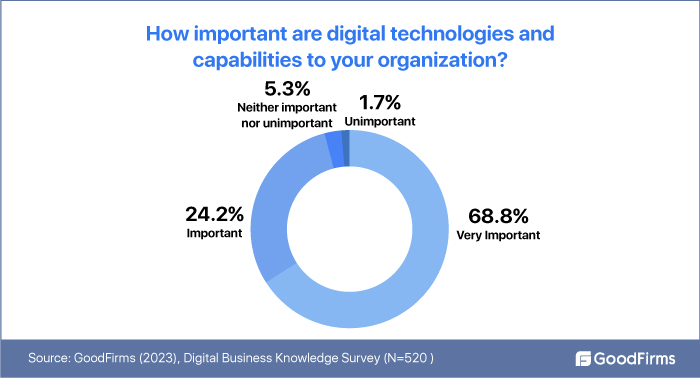
Digital technologies can aid businesses in many ways, such as:
- Increased efficiency and productivity by automating business procedures.
- Improved collaboration and communication between partners and customers.
- Improved decision-making with the help of real-time data and analytics.
- Cost reduction by shifting from traditional and slower processes to tech-based processes, lean and faster processes.
- Enhanced customer experience through personalized services.
Digital Marketing, CRM, and Accounting are the top three tools that are used by businesses
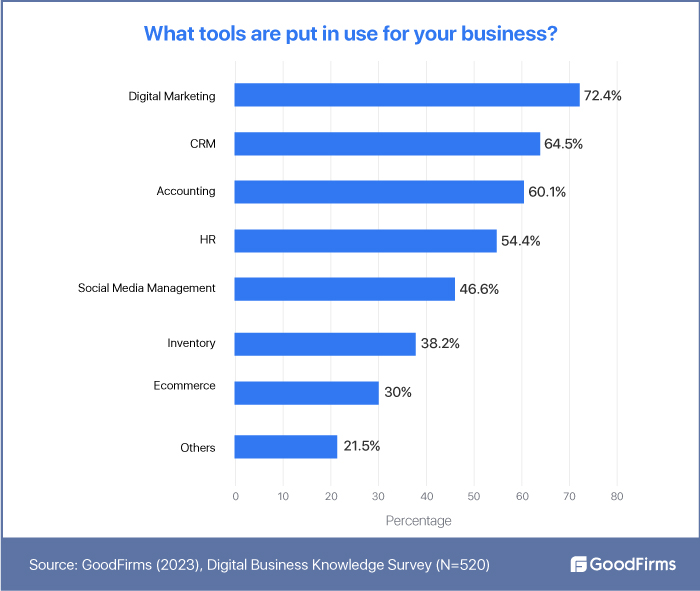
72.4% of organizations use digital marketing tools.
Businesses use digital marketing tools such as email marketing, SMM tools, graphic design tools, lead generation applications, SEO tools, etc., to boost their digital marketing campaigns, reach the target audience, promote brands goods/services, increase brand awareness, attract new customers, etc.
“We also have implemented various digital marketing tools, including social media and search engine optimization (SEO). These tools have enabled us to better engage with our customers and create personalized experiences. We have used these tools to increase website traffic, drive conversions, and increase customer loyalty, says Thomas Niemczewski, Founder & Digital Marketing Professional at Dream Chasers.
Thomas Niemczewski reveals further about other tools they have deployed-
“We have also implemented various data analytics and business intelligence tools that have enabled us to track and analyze customer behavior and preferences. By leveraging these tools, we have been able to understand our customers better, focus our marketing efforts, and develop new products and services.
64.5% of the surveyed organization say they use CRM tools.
Businesses can boost business performance with the help of a CRM system by - increasing sales effectiveness and giving high priority to leads and prospects that have a strong chance of being converted and closed due to customer interactions with the business.
“The digital solutions we have installed in our business include a CRM with integrated automation for voicemails and text messages. This allows our agents to spend less time texting their leads and more time talking to leads that answer their phones, reveals Tim Connon, Founder of Paramount Quote.
60.1% of the surveyed companies use accounting tools.
Accounting software is a crucial tool for the organization's financial data and is used for everything from basic invoicing and billing to tax calculations and project management. Additionally, it aids in customer management, bank account reconciliation, and the creation of analytical financial reports that support the steady and seamless expansion of the business.
According to Marcus Clarke, Founder of Searchant,
“Digital transformation enabled us to focus on wider business opportunities by moving core business functions, such as finance and HR, away from manual processes and automating key areas like payroll. Data location and retrieval are key to enabling digital processes and automation.”
54.4% of organizations use HR tools.
HR professionals may save time and money and manage employees more effectively with the help of HR software. HR software handles all essential HR processes, including new hiring requests and employee exit interviews.
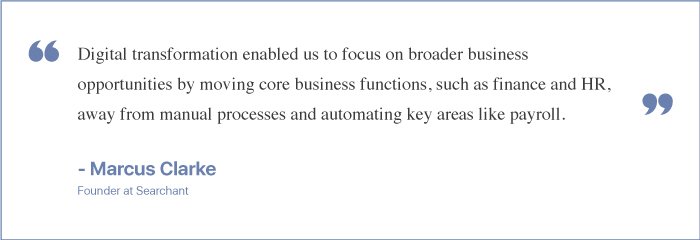
Other Tools used by organizations include:
- 46.6% of surveyees use social media management tools to manage all social media needs, including planning, scheduling, posting, monitoring, etc.
- 38.2% of respondents say they use an inventory management tool to manage, control, and track the stock.
- 30% of surveyees use e-commerce tools to design the online store and help introduce the brand's products at the forefront to the customers.
- 21.5% of respondents also use multiple other tools for their day-to-day operations.
Software tools and applications can help businesses in digital transformation in several ways. They can facilitate improved communication, collaboration, and information sharing, increase investment returns, centralize data, enhance employee experiences, boost digital adoption, and retain customers. They can also help to create a more efficient and productive workplace and help to stay ahead of competitors.
Key Findings
- 78.6% of the surveyees have digitized their business processes.
- Machine Learning, AI, and AR/VR are the most known digital technologies, as per Goodfirms’ survey.
- 72.8% of surveyees consider lower operational costs as a primary reason for digitizing their businesses.
- 70% of respondents say digital businesses can provide better customer satisfaction.
- According to 64.2% of surveyees, business digitization can help improve quality and sustainability.
- 72.8% of surveyees say they witnessed improved customer experience post-digitizing.
- 68.8% of the surveyees consider digital technologies and capabilities important to their organization.
- 48.4% of surveyees believe digitization can empower employees by providing them with the tools and resources they need to work more effectively and efficiently.
- 54.2% of respondents say adopting business digitization can lower operational costs.
- 52.7% of surveyees say they cannot adopt digitalization due to a lack of business budget.
- Digital Marketing, CRM, and Accounting are the top three tools that are used by businesses.
Conclusion
The development of technology and the shifting consumer demands and expectations determine the direction of digital business. Digitization helps to promote automation and allows businesses to increase operational efficiency. Digitization lowers the need for human resources resulting in low operating costs and reducing the chances of error occurrence.
The significant benefits that businesses gain from digitization include the capacity to access a broader and more diversified customer base, better insights to enhance productivity, lower operational costs, and the opportunity to personalize customer experiences.
Businesses also face digitization barriers, such as the cost of integrating new technologies, the requirement to adapt to changing technologies and customer expectations, the risk of data breaches and other security issues, and the lack of executive support.
Despite these challenges, businesses must take steps to adopt digital business practices. It helps meet the customer's demands and expectations and helps companies stay competitive in the digital world.
We sincerely thank our Research Partners for their valuable insights.
References
- https://www.globenewswire.com/news-release/2020/08/14/2078517/0/en/The-World-s-Digital-Transformation-Industry-2020-2025-Trends-Opportunities-and-Competitive-Landscape.html
- https://www.weforum.org/press/2016/01/100-trillion-by-2025-the-digital-dividend-for-society-and-business/
- https://www.statista.com/statistics/870924/worldwide-digital-transformation-market-size/
- https://www.gartner.com/en/information-technology/insights/digitalization
- https://www.statista.com/statistics/1247592/future-of-work-top-industry-market-share/
- https://www.capgemini.com/wp-content/uploads/2019/06/5G-in-industrial-operations.pdf
- https://www.mckinsey.com/capabilities/mckinsey-digital/our-insights/accelerating-the-digitization-of-business-processes
- https://www.businessofapps.com/data/uber-statistics/
- https://www.ibm.com/blogs/internet-of-things/iot-resilient-business-operations/
- https://www.mckinsey.com/~/media/McKinsey/Business%20Functions/Organization/Our%20Insights/COVID%2019%20and%20the%20employee%20experience%20How%20leaders%20can%20seize%20the%20moment/COVID-19-and-the-employee-experience-How-leaders-can-seize-the-moment.pdf
- https://about.google/belonging/diversity-annual-report/2022/
- https://iimskills.com/marketing-strategy-of-netflix/
- https://info.microsoft.com/rs/157-GQE-382/images/EN-US-CNTNT-ebook-Enterprise_Cloud_Strategy_2nd_Edition_AzureInfrastructure.pdf
- https://amrd.toyota.com/app/uploads/2022/02/ATwhitepaper.pdf
- https://home.kpmg/content/dam/kpmg/xx/pdf/2020/09/harvey-nash-and-kpmg-cio-survey-2020-infographic.pdf
Survey Participant Demographics
Firmographics:
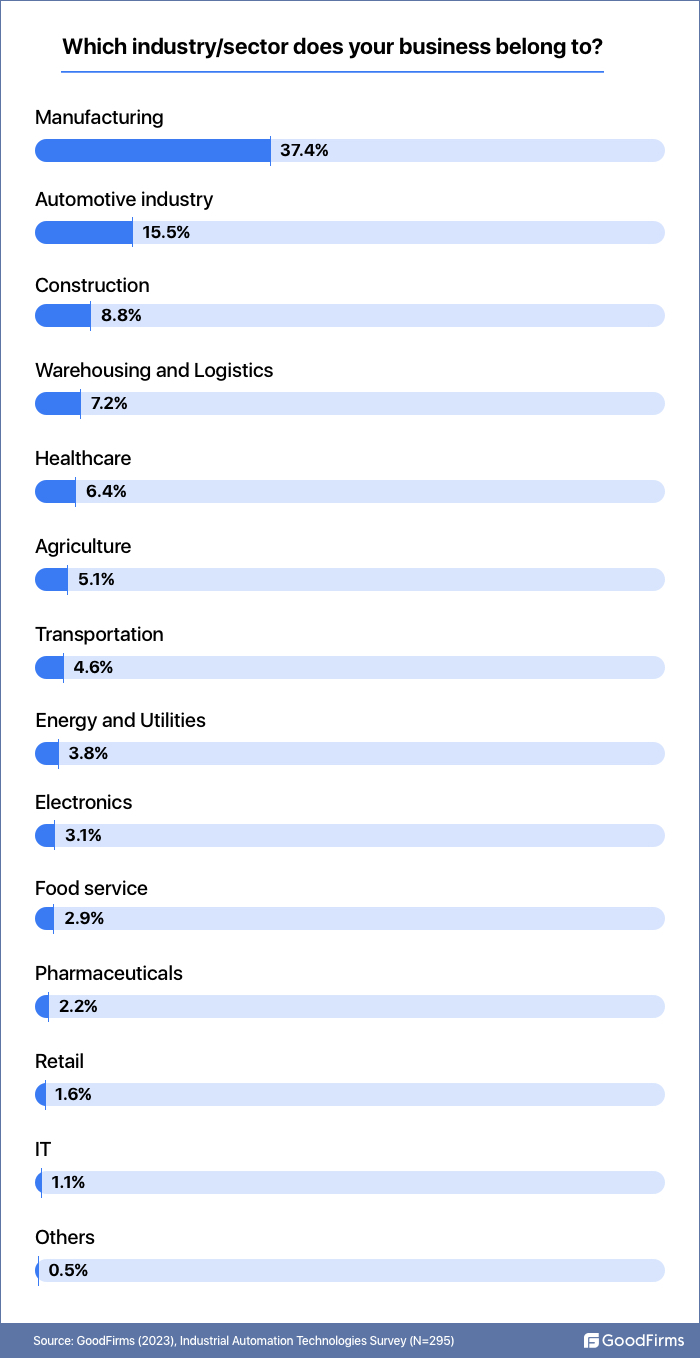
The queried business owners, professionals, or executives comprise 31.5% of the IT and Technology sector, 20.1% provide professional services, 9.3% comprise the education sector, 7.6% are financial service providers, and many more.
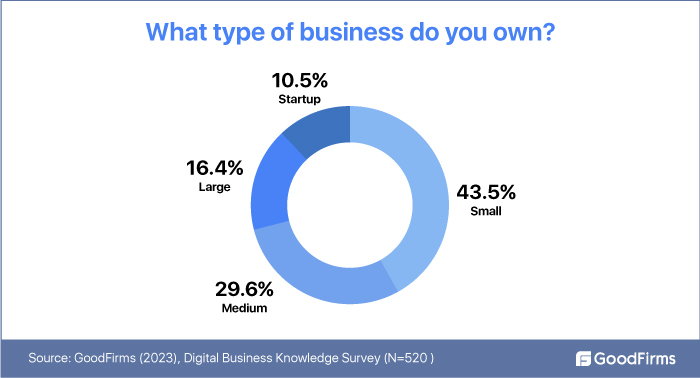
According to the Goodfirms survey, 43.5% of the participants have small businesses, 29.6% own medium-scale businesses, 16.4% of the surveyees have large-scale organizations, and 10.5% have started startup businesses.
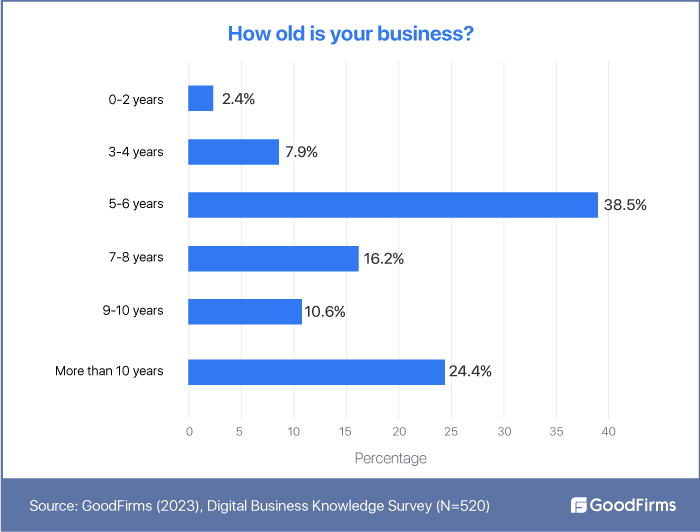
38.5% of the survey participants have been running their businesses for 5 to 6 years. At the same time, 24.4% of them have been operating their business activities for more than 10 years.
